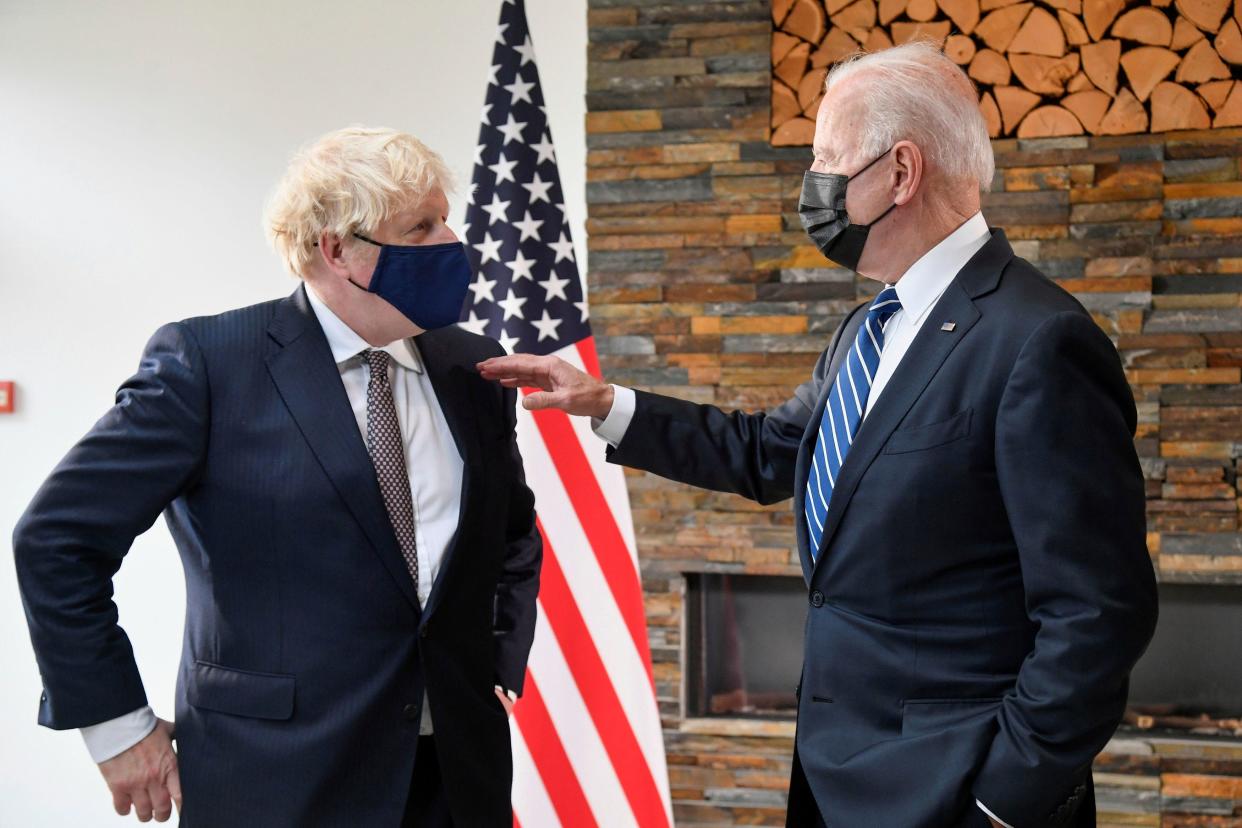OnPolitics: G-7 leaders address Ukraine crisis, gas and food prices

Welcome to a new week, OnPolitics readers!
The Supreme Court on Monday sided with a former high school football coach who lost his job for offering prayers at the 50-yard line after games despite objections from the school district in which students felt compelled to take part.
In the latest instance of the nation's highest court backing a religious freedom claim, a majority of the justices said assistant coach Joseph Kennedy's prayers were a private matter and did not amount to the school district's endorsement of Christianity.
Associate Justice Neil Gorsuch wrote the 6-3 majority opinion. The court's three liberal justices dissented, asserting that the majority had effectively abandoned a 1971 precedent that had once set the standard for how such cases should be resolved.
The decision came on the heels of a series of rulings in which the court has significantly shifted the interpretation of the Constitution toward a conservative viewpoint. Chief among those was the court's decision on Friday to overturn Roe v. Wade, the 1973 decision that established a constitutional right to abortion.
It's Amy and Chelsey with today's top stories out of Washington
Biden and global leaders address Ukraine conflict, food crisis at G-7 summit
Group of Seven nations are moving closer to capping the price that countries can pay for Russian oil, a senior U.S. official said.
The official said leaders aim to further restrict Vladimir Putin's cash flow, bring down prices at the gas pump and provide greater stability to energy markets.
Leaders were said to be zeroing in on the way Russian oil is shipped. The U.S. official said G-7 leaders are planning to direct their governments to take urgent steps to design a price cap mechanism for countries that do not participate in the economic alliance.
Leaders' plans to tackle Ukraine crisis: The U.S. also announced on Monday that it would impose sanctions that would make it harder for Russia to replace its military equipment. The official said that the U.S. Treasury Department will introduce blocking sanctions on private military companies operating in Ukraine and Russian officials trying to exert authority in contested areas.
G-7 leaders have also agreed on a new way to fund the Ukrainian war effort, according to the White House. A fact sheet on the new measures says nations will seek to use funds generated by new tariffs on Russia to help Ukraine. As part of the announcement, the U.S. says it will raise tariffs on roughly $2.3 billion of Russian goods.
Why the conversation around food matters: Up to 50 million people in 45 countries are on the brink of famine as the costs of food, fuel and fertilizer have gone up, and grains grown in Ukraine that typically feed millions of people can’t be exported.
Millions of people could starve to death. Countries and regions could become destabilized as food shortages led to riots, protests and increased migration, experts warn. Finding ways to prevent sure dire outcomes will be high on the G-7 agenda as the summit continues for the next few days.
Want this news roundup in your inbox every night? Sign up for OnPolitics newsletter here.
Real quick: stories you'll want to read
Two Americans face death penalty in Russia: The State Department has told the families of war volunteers Alexander John-Robert Drueke, 39, and Andy Tai Ngoc Huynh, 27, that “every single avenue of communication is being employed” after their capture by Russian forces on June 9.
Legitimacy of SCOTUS questioned: Public approval of the high court further declined after justices' decision to overturn Roe v. Wade Friday.
States compete to lead nominating calendar: Iowa has traditionally led the early voting window, but the Democratic National Committee has recently allowed any state to compete for the position.
U.S. can't outcompete wheat production: U.S. growers are struggling to fill the void after Russia-Ukraine conflict disrupted the wheat market in top producer, Ukraine.
The 5 GOP lawmakers who asked for presidential pardons
Evidence presented during the last hearing of the Jan. 6 committee Thursday revealed that former President Donald Trump and his allies devised several schemes to validate claims of 2020 presidential election fraud. None worked, due to the intervention of Justice Department officials, but at least five Republican lawmakers who supported Trump requested presidential pardons after the attack on the Capitol.
Reps. Matt Gaetz of Florida, Mo Brooks of Alabama, Scott Perry of Pennsylvania, Andy Biggs of Arizona and Louie Gohmert of Texas all issued statements denying the allegations of the committee or condemning the panel altogether.
Catherine Ross, a law professor at George Washington University and author of “A Right to Lie? Presidents, other liars and the First Amendment,” told USA TODAY that a pardon request suggests an admission to guilt.
“The most likely explanation is that they knew they were guilty of a crime and they didn’t want to be prosecuted and they didn’t want to go jail,” Ross said. “It suggests knowledge of culpability and legal risk.”
The five men have more than just their pardon request in common. All are members of the Freedom Caucus, the far-right coalition in the House that grew out of the Tea Party movement and all voted against certifying Electoral College votes in battleground states Arizona and Pennsylvania. Former Trump lawyer John Eastman suggested in a six-point plan that the states – two of seven swing states Trump lost – should not be counted toward President Joe Biden.
When life begins is a central debate driving the abortion debate. Here's what different religions have to say on the issue. – Amy and Chelsey
This article originally appeared on USA TODAY: Biden, G-7 leaders tackle Ukraine conflict, gas prices and food crisis

 Yahoo Movies
Yahoo Movies 
